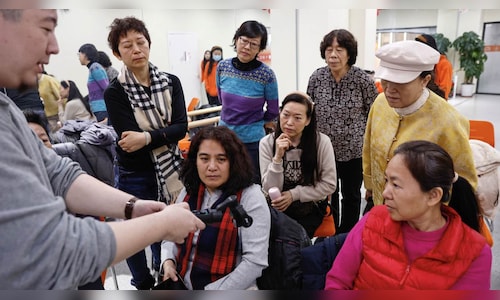As China’s population ages rapidly and economic uncertainties affect the middle class, “silver tourism” is gaining traction. More retirees, particularly from affluent coastal cities, are traveling both domestically and internationally. Many of these retirees have amassed considerable savings due to the country’s robust economic growth.
China’s older population They often retire earlier than their Western counterparts, at around 50 for women and 60 for men, and with fewer family responsibilities, they have more leisure time.
Also read: International air traffic finally increases to and from China as Beijing tweaks visa rules
Travel companies are beginning to adjust their services to better meet the needs of this growing demographic. “We are seeing a notable rise in affluent elderly Chinese consumers who are eager to invest in high-quality lifestyle experiences and personal enrichment,” Wee-Hoon Tan, senior vice-president of product development and marketing at Viking Cruises China, told Reuters.
Tan described this shift as significant, noting that it represents a departure from the traditionally cautious spending habits of older Chinese individuals who have historically been frugal. With around 300 million people aged 50 to 60—roughly equivalent to the U.S. population—set to retire in the next decade, the National Committee on Aging projects that silver travel will constitute 50% of domestic travel by 2040.
Also read: In respite to policymakers, China’s travel spending during Lunar New Year surpasses pre-Covid levels
In response, Viking Cruises, based in Switzerland, and Shanghai’s University for the Elderly have teamed up to offer cultural and historical courses alongside cruise itineraries through Asia’s coastal regions and European rivers. Viking’s ships are equipped with accessibility features such as barrier-free elevators, handrails, large-font remote controls, and toiletries for elderly travelers, and they offer a noodle bar for early breakfasts.
Additionally, the Shanghai Railway Bureau has introduced 10 long-distance tourist trains this year, designed specifically for travelers aged 50-70. These trains, which traverse scenic routes like the Huangshan mountains and Lishui’s rice terraces, are staffed with healthcare professionals to cater to elderly passengers.
Traveller Tao Wen, who retired last year, expressed that having access to medical services during her travels gave her “peace of mind.” She noted that companies must recognize that older travellers’ spending patterns differ from younger ones, with a greater emphasis on cost-effectiveness.
Hilton Hotels in China have responded to this trend by offering discounts of up to 6% for guests over 65 and organizing tea tastings and wellness activities.
Wendy Huang, senior vice president at Hilton Greater China, noted that the surge in elderly travelers is “clearly visible”.
According to China’s tourism academy, the number of active elderly travelers is expected to exceed 100 million next year, with the domestic silver tourism market projected to reach 1 trillion yuan ($139.9 billion) annually.
However, challenges such as a weak social safety net, insufficient pensions, and inadequate elderly care outside major cities might limit retirees’ ability to spend on travel. The slowing economy could further impact this, as noted by Herald van der Linde, head of Asia Equity strategy at HSBC, according to Reuters.
Despite these obstacles, van der Linde acknowledges that the aging population and evolving consumption patterns are continuing to take shape.
Jane Sun, head of Trip.com, China’s largest online travel agency, suggests that silver travelers can benefit from off-peak travel times to maximize hotel discounts. She advises travel partners to offer familiar comforts like green tea and slippers, which, although inexpensive, help make older travelers feel more at home.
(With inputs from Reuters)










